|
|
|
Sort Order |
|
|
|
Items / Page
|
|
|
|
|
|
|
| Srl | Item |
| 1 |
ID:
138905
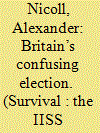

|
|
|
|
|
| Summary/Abstract |
Were it to be a straightforward ‘economy, stupid’ contest, the Conservative Party, led by Prime Minister David Cameron, might be expected to triumph in Britain’s 7 May 2015 general election. The government that took office in 2010, a coalition between the Conservatives and the third-placed Liberal Democrats, inherited a large budget deficit and a steep recession that had
begun with the 2008 financial crisis.
|
|
|
|
|
|
|
|
|
|
|
|
|
|
|
|
| 2 |
ID:
108982


|
|
|
| 3 |
ID:
117498
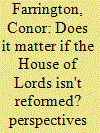

|
|
|
|
|
| Publication |
2012.
|
| Summary/Abstract |
In May 2011 the Coalition government published a draft bill for reform of the House of Lords, proposing an upper chamber composed of 80% elected and 20% appointed members serving for single 15-year terms. These plans reflect aspects of the stated positions of the main political parties, votes in the House of Commons, and broader political and scholarly debates over the past decade. Nevertheless, there is significant opposition from across the political spectrum, and there is a significant possibility that the proposed reforms will not be enacted before the next general election. This article draws on the views of participants (including three current peers) in a Symposium at Trinity Hall, Cambridge to argue that the likely failure of the reforms may be less disastrous than many suppose. Especially since the 1999 reforms, the House of Lords is in many ways a more active and legitimate chamber than is commonly realised.
|
|
|
|
|
|
|
|
|
|
|
|
|
|
|
|
| 4 |
ID:
091109
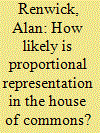

|
|
|
|
|
| Publication |
2009.
|
| Summary/Abstract |
This article asks what international evidence suggests about the likelihood of major reform of the system used to elect the British House of Commons. It identifies four paths that have generated major electoral reform or come close to doing so in established democracies in recent decades and examines how likely each is to lead to reform in the UK. It argues that, on this evidence, reform in the UK is unlikely but not impossible.
|
|
|
|
|
|
|
|
|
|
|
|
|
|
|
|
| 5 |
ID:
138888
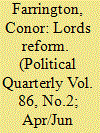

|
|
|
|
|
| Summary/Abstract |
The failure of the Coalition government's attempt to reform the House of Lords has by no means taken further reform off the political agenda. The commitment to installing an elected upper chamber is still widely shared across the political spectrum, on the basis of perceptions that the House of Lords lacks democratic legitimacy. Against this view, this article considers recent literature upon non-electoral representation, deliberative democracy and bicameralism, which together highlight the possibility of an unelected second chamber playing a legitimate role within a wider (democratic) system of government. The article then considers the House of Lords from this perspective, reflecting on changes in the upper chamber since the 1999 reforms and evaluating its role within the wider political system. The paper concludes by suggesting that political debate should focus upon small-scale reforms to ensure that the Lords becomes more effective, representative and legitimate, within the constraints of its present role.
|
|
|
|
|
|
|
|
|
|
|
|
|
|
|
|
| 6 |
ID:
093205
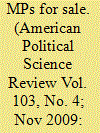

|
|
|
|
|
| Publication |
2009.
|
| Summary/Abstract |
Many recent studies show that firms profit from connections to influential politicians, but less is known about how much politicians financially benefit from wielding political influence. We estimate the returns to serving in Parliament, using original data on the estates of recently deceased British politicians. Applying both matching and a regression discontinuity design to compare Members of Parliament (MPs) with parliamentary candidates who narrowly lost, we find that serving in office almost doubled the wealth of Conservative MPs, but had no discernible financial benefits for Labour MPs. Conservative MPs profited from office largely through lucrative outside employment they acquired as a result of their political positions; we show that gaining a seat in Parliament more than tripled the probability that a Conservative politician would later serve as a director of a publicly traded firm-enough to account for a sizable portion of the wealth differential. We suggest that Labour MPs did not profit from office largely because trade unions collectively exerted sufficient control over the party and its MPs to prevent members from selling their services to other clients.
|
|
|
|
|
|
|
|
|
|
|
|
|
|
|
|
| 7 |
ID:
092395


|
|
|
|
|
| Publication |
2009.
|
| Summary/Abstract |
In May 2009, revelations made in The Daily Telegraph about the way that MPs had used and abused the House of Commons expenses and allowances regime threw the British political system into turmoil, forced the resignation of the Speaker of the Commons along with a number of implicated MPs, and ignited talk about a crisis in parliamentary democracy and a collapse of public trust in politics. This article explores the events that led to this situation, from the structure of MPs pay and allowance system, the Freedom of Information context that framed the disaster, and the crisis of transparency which the House of Commons has itself precipitated. It argues that, talk of parliamentary reform aside, MPs must radically rethink the way that they approach their representative role and the nature of their broader engagement with the public they claim to serve.
|
|
|
|
|
|
|
|
|
|
|
|
|
|
|
|
| 8 |
ID:
174012
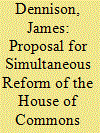

|
|
|
|
|
| Summary/Abstract |
The disproportional electoral system of the House of Commons is increasingly contested, while the undemocratic composition of the House of Lords has been criticised for a century. I first argue that simultaneous reform of both chambers creates the opportunity for far more optimal outcomes than possible under attempts to reform just one chamber. I then argue that bicameralism should continue so that the UK can be represented in two, currently convoluted, ways: as a singular polity in partisan terms and as both an aggregate of constituencies and union of nations, in geographic terms. The former would best take place in a reformed House of Commons, responsible for government formation, and composed of around 300 MPs elected by ‘pure’ proportional representation. The latter would best take place in a reformed House of Lords of around 300 peers, elected by plurality voting from single‐member constituencies. Together, these reforms would improve governance, representation, legitimacy, accountability and the robustness of the union, while retaining celebrated facets of the status quo such as simplicity and the direct constituency link.
|
|
|
|
|
|
|
|
|
|
|
|
|
|
|
|
| 9 |
ID:
095292
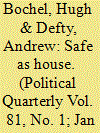

|
|
|
|
|
| Publication |
2010.
|
| Summary/Abstract |
Social policy is of key importance to contemporary society, accounting for two thirds of public expenditure and, through provision such as the NHS, pensions, benefits, schools, universities and social care, touching on the lives of much of the population on a daily basis. It has also been one of the areas where the Conservative party have sought to change their image, and to some extent policies, under David Cameron. Drawing upon a range of evidence, including interviews with more than ten per cent of the House of Commons and the House of Lords, this article examines the potential challenges for a Conservative government of either stance, focusing on the extent of possible support for the Conservatives' approach to social policy amongst three key groups: the public, MPs, and members of the House of Lords.
|
|
|
|
|
|
|
|
|
|
|
|
|
|
|
|
| 10 |
ID:
095287
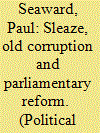

|
|
|
|
|
| Publication |
2010.
|
| Summary/Abstract |
There is nothing new about the existence of a political class, nor about the electorate's distaste for paid politicians. In the middle ages, voters made clear their preference for representatives who were prepared to serve without payment; in the eighteenth century, the increase in the number of MPs paid by the state, whether in salaried posts or as sinecurists, was seen as a corrupt and pernicious extension to the influence of the crown; in the nineteenth and early twentieth century the payment of MPs by the taxpayer was widely regarded as an improper and offensive idea. The current furore over MPs' pay and expenses is another example of the intense suspicion with which MPs who have received money from the state have been regarded from the seventeenth to the twentieth century.
|
|
|
|
|
|
|
|
|
|
|
|
|
|
|
|
| 11 |
ID:
118229
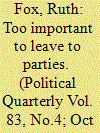

|
|
|
|
|
| Publication |
2012.
|
| Summary/Abstract |
At the current rate of progress it will be another century before parity of representation between men and women is achieved in the House of Commons. This article explores why and how legal guarantees may now be the best available route to secure equality of representation following the repeated failure of the political parties to deliver any significant improvement in numbers through their own preferred, voluntary mechanisms. It explores how the concepts of equality and political representation need to be recalibrated in order to place greater emphasis on democracy rather than meritocracy, and on outcomes as much as opportunities, and offers a broad outline of how a legislative guarantee might be structured and operate in practice.
|
|
|
|
|
|
|
|
|
|
|
|
|
|
|
|
| 12 |
ID:
109021
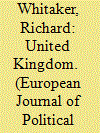

|
|
|
|
|
|
|
|